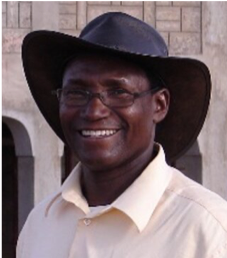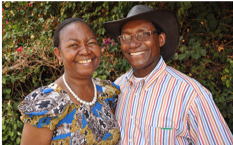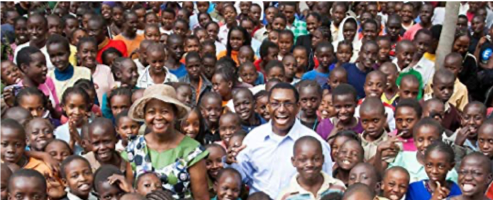Loving Well: Charles Mulli and the Children
Loving Well: Charles Mulli and the Children

Charles was born in 1949 to an alcoholic and abusive father in Kathithyamaa Village in Kangundo, Machakos, Kenya. By the time he was five years old, he had been utterly abandoned by his parents. He became a street child. Begging for food and drink and building shelter with tin and cardboard, he survived. Adults along the way gave him access to the free primary school, but there was no home for him, so he continued to beg and do odd jobs to provide his meager daily sustenance. When Charles finish the eighth grade in 1966, he dreamed of attending the university, but he had no funds. It was too big a dream for a homeless youth.
At seventeen, Charles walked into a church and, during that service, received the grace of Jesus Christ for salvation and became a follower. He then walked forty-three miles to Nairobi to look for work and found a job at a private home as gardener and helper in the laundry and kitchen. He was transferred the next year to the Kakuzi Farm in Thika, north of Nairobi, and promoted to farm assistant. Here he met Esther, who would become his right hand, loving wife, and ministry partner. They married in December 1970 and had a big family of eight children together.

In the next two decades, Charles went to work for a road construction company, saved his money, and opened his own public transportation firm in the Rift Valley. He also purchased land in various places, sold tires, learned the insurance business, and started agricultural ventures on the side. Charles built his family a large house on an estate near Eldoret. He became a millionaire.
One day in 1986, when Charles rolled up to an office building in his lovely car, a group of street children asked if he wanted them to protect his car while he was in his appointment. He ignored them, presuming that they would spend his money on drugs. When he returned following his meeting, his discovered that his car tires had been stolen. He says God used this event to turn his world upside down. He began to see himself through the children's eyes, and says God would no longer allow him to continue living a lavish lifestyle while these children were living on the streets in despair. They reminded him of who he once had been.
One day in 1986, when Charles rolled up to an office building in his lovely car, a group of street children asked if he wanted them to protect his car while he was in his appointment. He ignored them, presuming that they would spend his money on drugs. When he returned following his meeting, his discovered that his car tires had been stolen. He says God used this event to turn his world upside down. He began to see himself through the children's eyes, and says God would no longer allow him to continue living a lavish lifestyle while these children were living on the streets in despair. They reminded him of who he once had been.

He went home and spoke to his wife and children about selling their business and providing for abandoned children. He vowed never to work for money again. In 1989, Charles and Esther sold all of their businesses, started Mully Children's Family (MCF, with slightly different spelling), and took in three abandoned children. When there were 100 of the children, sleeping on beds all over the huge house, Charles and Esther purchased some unattractive land in Machakos County, near Yatta, and built a sanctuary for the children, complete with dorms and primary and secondary schools. Charles and his wife Esther moved to Yatta permanently, and also transferred their biological children from their private schools to come and learn with the destitute children at the MCF schools.
Today, more than 3,000 children live in Mulli homes located across Kenya in Yatta, Ndalani, Turkana, Kilifi, Lodwar, Mombasa and Kitale. There are others in Mwanza and Dar es Salaam in Tanzania as well. Since 1989, Charles and Esther have become "Daddy" and "Mummy" to more than 23,000 abandoned children. These young ones are rescued and provided with counseling and a sense of belonging to the community. The Yatta sanctuary is indeed a city of children embraced by love.
Each child is educated, from kindergarten through high school, and vocational training centers for construction, tailoring, beauty and hairdressing services are also available for young adults who want a career in these areas. For others, higher education is available. Each year, more than 100 students from the center are accepted into various colleges and universities. MCF pays their tuition fees and Charles visits them and attends their graduations. His next dream is to build a university on the campus. The primary goal is to equip them to be productive citizens who love Jesus.
With one tractor, in 1996, Charles began farming in Yatta. Now, the children eat food grown at the MCF farm, which over the years has been built into a large mechanized, sustainable, and self-supporting commercial enterprise. It sells French beans, cabbage, and tomatoes exported to Europe. Instead of asking for donations, the children from the home have become so self-reliant that they donate food and other social services to the neighboring community.
The MCF offers ten areas of intervention, and ensures that the children and communities they serve have access to sufficient, safe, and nutritious food to meet their dietary needs. It offers a school feeding program, dry-land farming, emergency relief food distribution, water, harvesting, and conservation for irrigation farming, the distribution of milk goats to communities, livestock farming, and globally certified produce for export. It also offers health care programs that promote the well-being of children, women, and the larger community through free medical care, comprehensive HIV/AIDS treatment, and free medical camps. Other highlights include a re-forestation project that has seen three million trees planted in his region of the country, helping to change its micro-climate. Several dams have also been built to provide water, not only to the organization's young charges, but also the surrounding communities.
Mulli is the author of My Journey of Faith, Christian Heroes: Then and Now, Charles Mulli: We are Family, and is the subject of two autobiographies and a children's book written by Paul H. Boge: Father to The Fatherless, Hope for The Hopeless, and The Biggest Family In The World. Scott Haze also created a documentary film about him in 2017, which won an Oscar nomination.
Each child is educated, from kindergarten through high school, and vocational training centers for construction, tailoring, beauty and hairdressing services are also available for young adults who want a career in these areas. For others, higher education is available. Each year, more than 100 students from the center are accepted into various colleges and universities. MCF pays their tuition fees and Charles visits them and attends their graduations. His next dream is to build a university on the campus. The primary goal is to equip them to be productive citizens who love Jesus.
With one tractor, in 1996, Charles began farming in Yatta. Now, the children eat food grown at the MCF farm, which over the years has been built into a large mechanized, sustainable, and self-supporting commercial enterprise. It sells French beans, cabbage, and tomatoes exported to Europe. Instead of asking for donations, the children from the home have become so self-reliant that they donate food and other social services to the neighboring community.
The MCF offers ten areas of intervention, and ensures that the children and communities they serve have access to sufficient, safe, and nutritious food to meet their dietary needs. It offers a school feeding program, dry-land farming, emergency relief food distribution, water, harvesting, and conservation for irrigation farming, the distribution of milk goats to communities, livestock farming, and globally certified produce for export. It also offers health care programs that promote the well-being of children, women, and the larger community through free medical care, comprehensive HIV/AIDS treatment, and free medical camps. Other highlights include a re-forestation project that has seen three million trees planted in his region of the country, helping to change its micro-climate. Several dams have also been built to provide water, not only to the organization's young charges, but also the surrounding communities.
Mulli is the author of My Journey of Faith, Christian Heroes: Then and Now, Charles Mulli: We are Family, and is the subject of two autobiographies and a children's book written by Paul H. Boge: Father to The Fatherless, Hope for The Hopeless, and The Biggest Family In The World. Scott Haze also created a documentary film about him in 2017, which won an Oscar nomination.
Awarded two honorary doctorates and many philanthropic awards, Charles Mulli is still the humble, soft-spoken, kindly man who remembers where he was when Jesus found and rescued him. He considers meeting the needs of abandoned children to be his life's mission, trusting in the God whose love has no limits.

-Karen O'Dell Bullock
Posted in PeaceWeavers